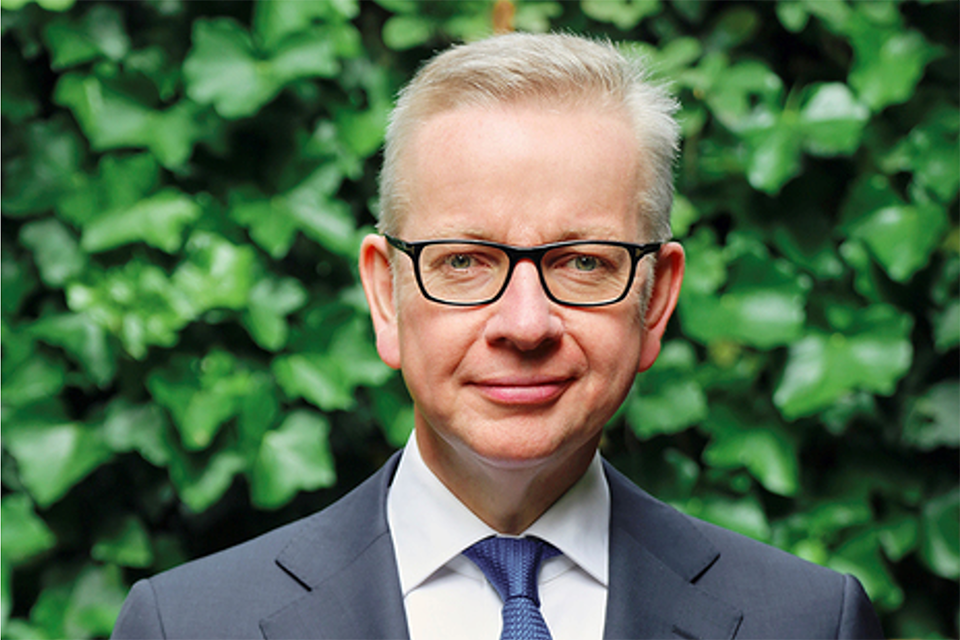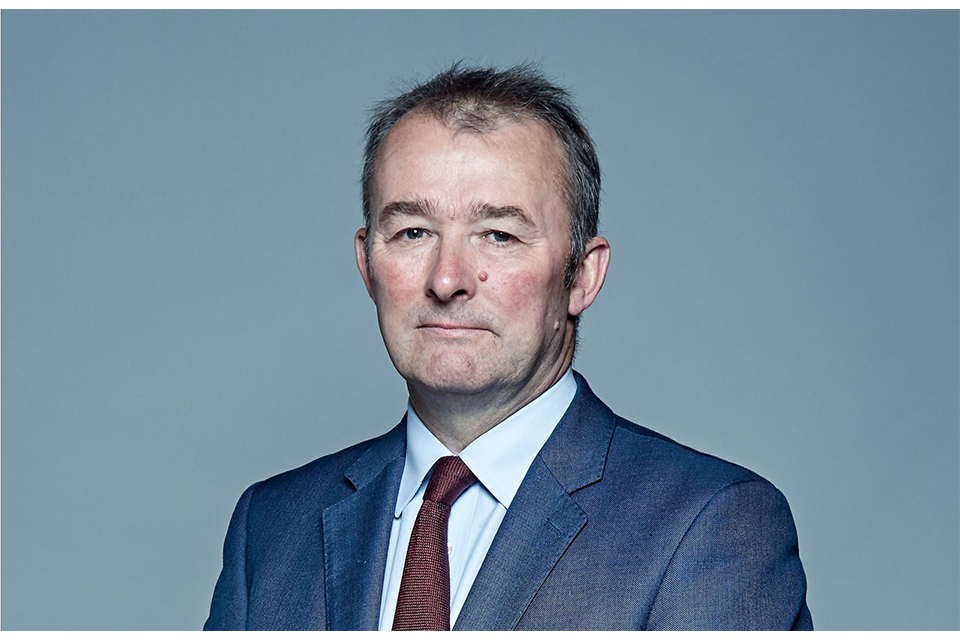The European Union (Withdrawal) Act and Common Frameworks: 26 June to 25 September 2021
Published 9 December 2021
Presented to Parliament pursuant to paragraph 4 of Schedule 3 to the European Union (Withdrawal) Act 2018

The Rt Hon Michael Gove MP, Secretary of State for Levelling Up, Housing and Communities, and Minister for Intergovernmental Relations

The Rt Hon Brandon Lewis CBE MP, Secretary of State for Northern Ireland

The Rt Hon Alister Jack MP, Secretary of State for Scotland

The Rt Hon Simon Hart MP, Secretary of State for Wales

Neil O’Brien MP, Parliamentary Under Secretary of State for Levelling Up, The Union and Constitution
Foreword
Since 2017, the UK Government, Scottish Government, Welsh Government and the Northern Ireland Executive have been working together to develop agreements covering a range of policy areas where powers have returned from the European Union and intersect with devolved competence. This has a direct bearing on the lives of citizens across the United Kingdom. The development of UK Common Frameworks is guided by principles agreed at the Joint Ministerial Committee (EU Negotiations) (JMC(EN)) in October 2017 between the government, Scottish Government and Welsh Government, and later on 15 June 2020, endorsed by the Executive Committee of the Northern Ireland Executive.
Under Schedule 3 to the European Union (Withdrawal) Act 2018, the government has a statutory requirement to report to the UK Parliament every three months on the progress made on the development of UK Common Frameworks. This thirteenth European Union Withdrawal and Common Frameworks report details progress from 26 June to 25 September 2021. In addition to progress made, the report details that the government did not make use of powers under section 12 of the European Union (Withdrawal) Act 2018 to temporarily limit devolved competence in any policy areas. Reflecting the significant progress that has been made across policy areas to establish Common Frameworks in collaboration with the devolved governments, the government now intends to repeal section 12 powers (and make other consequential changes) through the enabling power set out in section 12(9) of the Act, subject to the will of Parliament.
During this reporting period, Neil O’Brien MP assumed responsibility within UK government for the Common Frameworks programme, as part of his role as Minister for Levelling Up, the Union and the Constitution, with the Rt Hon Michael Gove MP maintaining strategic oversight for the Union and constitution as Secretary of State for Levelling Up, Housing and Communities and Minister for Intergovernmental Relations. The government remains committed to working collaboratively with the devolved governments to further progress Common Frameworks.
A significant milestone in the programme was reached when on 8 July, provisional confirmation was secured for a further 21 Frameworks. Shortly after this reporting period ended, an additional Framework was provisionally confirmed on 14 October. This takes the total number of provisionally confirmed Frameworks to 29. Work is continuing to further develop these Frameworks. Additionally, on 31 August, Hazardous Substances (Planning) became the programme’s first Framework to be published as a final document.
Following the end of this reporting period, on 9 November, the government published its annual update to the Frameworks Analysis setting out a comprehensive breakdown of areas previously governed by EU law that intersect with devolved competence, including for the first time, rationales for policy areas where no Frameworks are required.
Implementation of Common Frameworks
1.1. Part 2 of Schedule 3 to the European Union (Withdrawal) Act 2018 requires that a Minister of the Crown report to Parliament at three month intervals on various matters pertaining to Common Framework including use of powers in s12 of, and Schedule 3 to, the 2018 Act to temporarily maintain EU law limits on devolved competence. Reports are shared with the devolved governments to enable them to maintain a concurrent level of scrutiny. The last report was published on 9 November 2021 and covered the reporting period 26 March to 25 June 2021.
1.2. The purpose of these reports is to ensure that the process of developing Common Frameworks, in collaboration with the devolved governments, is transparent and subject to robust parliamentary scrutiny.
Principles for Common Frameworks
1.3. EU laws created common UK-wide approaches even where those policy areas were otherwise within devolved competence. All 4 governments across the UK have agreed that common approaches will continue to be required in some areas now the UK has left the EU and exited the Transition Period.
1.4. In October 2017, the Joint Ministerial Committee (EU Negotiations) agreed upon principles to guide the work to create Common Frameworks. These principles are set out below:
1. Common Frameworks will be established where they are necessary in order to:
- enable the functioning of the UK internal market, while acknowledging policy divergence;
- ensure compliance with international obligations;
- ensure the UK can negotiate, enter into and implement new trade agreements and international treaties;
- enable the management of common resources;
- administer and provide access to justice in cases with a cross-border element;
- safeguard the security of the UK.
2. Frameworks will respect the devolution settlements and the democratic accountability of the devolved legislatures, and will therefore:
- be based on established conventions and practices, including that the competence of the devolved institutions will not normally be adjusted without their consent;
- maintain, as a minimum, equivalent flexibility for tailoring policies to the specific needs of each territory, as is afforded by current EU rules;
- lead to a significant increase in decision-making powers for the devolved administrations.
3. Frameworks will ensure recognition of the economic and social linkages between Northern Ireland and Ireland and that Northern Ireland will be the only part of the UK which shares a land frontier with the EU. They will also adhere to the Belfast Agreement.
1.5. The Northern Ireland Executive endorsed the JMC(EN) principles in June 2020. These principles continue to guide all discussions between the government and the devolved governments on Common Frameworks. Details of how these principles have been taken into account are included in this report, and will continue to be included in future iterations of this publication.
Progress Towards Establishing Common Frameworks
1.6. The following section sets out the steps taken during this reporting period by the UK government, in collaboration with the devolved governments, towards implementing long-term Common Frameworks. It also outlines how the Frameworks Principles have been taken into account.
Frameworks delivery
1.7. The work to establish Common Frameworks has five phases. The delivery plan below illustrates how a framework moves through these five phases of development. Each framework moves through this process at a different pace.
-
Phase 1: Principles and proof of concept: consists of engagement between the government and devolved government officials (also referred to as multilateral deep dives) to focus on Frameworks, as well as to establish some of the key interdependencies that affect multiple Frameworks.
-
Phase 2: Policy development: Detailed policy development takes place, including joint work between the UK government and devolved government officials to agree policy approaches and operational and governance arrangements for each policy area. Initial stakeholder engagement also takes place where appropriate. This results in jointly drafted and agreed outline Frameworks.
-
Phase 3: Review and consultation: The UK government and devolved governments collaborate to further develop and finalise policy approaches, explore interactions with cross-cutting workstreams, and agree operational and governance arrangements. Technical engagement takes place with sector-specific stakeholders. Towards the end of Phase 3, in-depth review and assessment takes place, conducted jointly at official level. This phase results in cross-departmental collective agreement on the policy approach within the government, and provisional confirmation of Frameworks by each administration. This in-depth review and joint confirmation ensures that a minimally operable framework, recognised as a ‘provisional framework’, is developed.
-
Phase 4: Preparation and implementation: The UK government and devolved government officials work jointly on any ongoing reappraisals of cross-cutting issues, present the Frameworks for parliamentary scrutiny and review parliamentary recommendations in order to finalise individual Frameworks. At the end of this phase, the provisional framework receives ministerial approval from the intergovernmental forum responsible for the Common Frameworks programme.
-
Phase 5: Post-implementation: Post-implementation arrangements take place, including regular cycles of review and, if appropriate, amendment. These vary between Frameworks and details continue to be developed as the Common Frameworks programme progresses.
1.8. Frameworks are undergoing continued development according to the requirements of their particular policy areas. The delivery process detailed above takes into account the need for Frameworks to be implemented in different ways, with some activities undertaken concurrently, to ensure that all of the necessary steps have been completed. Accordingly, Frameworks will progress and be finalised at different points in time, depending on their individual requirements.
Delivery plan
1.9. During this reporting period (26 June to 25 September 2021) the government continued to liaise with the devolved governments to coordinate the progress of the programme. The UK government and devolved governments have agreed to aim to complete delivery of the programme in March 2022 ahead of the pre-election period for the 2022 Northern Ireland Assembly elections.
1.10. Work on individual Frameworks has been ongoing during this reporting period, with a specific focus on taking into account the cross-cutting issues that apply to those Frameworks. Delivery timelines for each Framework will vary according to the cross-cutting issues that apply and their level of intersect.
Framework coordination
1.11. Frameworks are being developed through constructive discussions between the government and the devolved governments. These discussions have continued during the latest reporting period.
1.12. A productive meeting between the, then, government minister responsible for the Frameworks programme, Chloe Smith MP, and her devolved government counterparts took place on 8 September 2021. The meeting enabled significant progress to be made in addressing cross-cutting issues which impact on Frameworks.
1.13. During this reporting period there were two meetings of the UK government-devolved governments Frameworks Project Board, involving Cabinet Office senior officials and their counterparts in the devolved governments. The Project Board monitors progress and facilitates agreement on the direction of the UK Common Frameworks programme.
1.14. At an operational level, there have been weekly Frameworks Project Team meetings between officials in the government and the devolved governments to support the detailed development of Frameworks by policy officials.
1.15. During this reporting period, the UK government-devolved government Cross-Cutting Issues sub-group continued to meet on a fortnightly basis, reporting into the Frameworks Project Team and Project Board. The group discussed individual cross-cutting issues, and actions to be taken to address the intersection of the cross-cutting issues with individual Frameworks. Additionally, officials from the Cabinet Office, the Department for Business, Energy and Industrial Strategy and the devolved governments held 6 meetings to address the specific impact of the UK Internal Market Act on Frameworks and co-draft an exclusions process.
1.16. The Cabinet Office, as programme coordinator, has also engaged with UK government departments through a fortnightly Deputy Director-level Frameworks group on strategic policy development and planning, alongside a monthly Frameworks Working Group to provide policy leads with updates and to discuss barriers and drive progress. Working group meetings have also taken place between Cabinet Office officials and officials from Framework-owning departments on individual Frameworks.
Programme development
Framework agreement
1.17. The final Hazardous Substances (Planning) framework was published on 31 August, having completed scrutiny by all 4 legislatures earlier. This is the first framework in the programme to have reached this point.
1.18. On 8 July, a further 21 Frameworks were provisionally confirmed by all governments. After this reporting period ended, an additional Framework (Company Law) was provisionally confirmed on 14 October. The government and the devolved governments agreed that portfolio minister clearance would represent provisional confirmation of Frameworks. This takes the total number of finalised Frameworks to one and provisionally confirmed Frameworks to 29. The provisionally confirmed Frameworks are:
1. Emissions Trading System; 2. Radioactive Substances; 3. Late Payment; 4. Specified Quantities and Packaged Goods; 5. Company Law; 6. Agricultural Support; 7. Agriculture - Fertiliser Regulations; 8. Agriculture - Organic Production; 9. Agriculture - Zootech; 10. Animal Health and Welfare; 11. Fisheries Management and Support; 12. Plant Health; 13. Plant Varieties and Seeds; 14. Air Quality; 15. Best Available Techniques; 16. Ozone Depleting Substances and F-gases; 17. Chemicals and Pesticides; 18. Resources and Waste; 19. Operator Licensing and Commercial Transport; 20. Driver Licensing; 21. Rail Technical Standards; 22. Roads - Motor Insurance; 23. Nutrition Labelling, Composition and Standards; 24. Blood Safety and Quality; 25. Organs, Tissues and Cells (apart from embryos and gametes); 26. Public Health Protection and Health Security; 27. Food Compositional Standards and Labelling; 28. Public Procurement; and 29. Food and Feed Safety and Hygiene Law.
Phase 4 development
1.19. All provisional Frameworks continued to undergo development towards their finalisation, which requires conclusion of:
a) Any remaining framework-specific policy development, including the resolution of cross-cutting issues;
b) Any further technical stakeholder engagement required; and
c) Parliamentary scrutiny by the legislatures of each administration with an interest in the framework.
Operational monitoring
1.20. Following the operational monitoring exercise conducted for the Nutrition Labelling, Composition and Standards (NLCS) Framework in the previous reporting period, the Project Team attended one of the quarterly Agriculture - Zootechnics Working Group meetings to observe the structures of the Framework. The topics discussed covered the intricate policy matters within the remit of the Framework, covering policy, compliance and legal issues. The group also considered the degree of intersection of their Framework with cross-cutting issues. The discussions demonstrated a high-level of engagement from all participants evidencing strong and embedded working relationships.
1.21. Project Team representatives joined the fourth monthly Public Procurement Working Group on 18 August. Officials shared a range of updates related to Public Procurement and discussed further development of the Framework itself. The discussion confirmed that the Working Group functioned well and facilitated timely information sharing, with policy teams reporting that the process of developing the Framework promoted strong relationships and regular engagement in a way that had not previously taken place. Additionally, non-procurement teams can also use the Working Group to obtain information on procurement relevant to their work.
1.22. All three operational monitoring sessions undertaken to date have evidenced good engagement between policy teams which has enabled open and honest engagement on a range of hypothetical and real life scenarios. The Frameworks in question have proved robust with no major concerns raised.
Transparency
1.23. The government is committed to transparency across the UK Common Frameworks programme, as evidenced by the publication of this thirteenth European Union (Withdrawal) Act and Common Frameworks report and previous reports. Each report has detailed the progress across the wider programme, and set out key milestones in individual Framework development. These reports, alongside the annual Framework Analysis, the finalised Framework, and provisional Frameworks, which have been published so far can be accessed on the government’s UK Common Frameworks webpage on gov.uk.
Parliamentary engagement
1.24. The government has continued to engage constructively with Parliament, most notably with the House of Lords Common Frameworks Scrutiny Committee (CFSC) chaired by Baroness Andrews. The CFSC invited Ministers from both the UK government and devolved governments to provide evidence to the committee on the programme several times during the reporting period. The, then, Minister for the Constitution and Devolution, Chloe Smith MP appeared in front of the committee on 13 July; Mick Antoniw MS, Counsel General and Minister for the Constitution (Welsh Government) appeared on 6 September, and George Eustice, Secretary of State for Environment, Food and Rural Affairs appeared on 13 September 2021. The government has continued to correspond with the committee throughout the reporting period, which included letters from Chloe Smith MP regarding her evidence session and the CFSC’s report Common frameworks: building a cooperative Union published earlier in 2021. George Eustice MP also wrote letters to the CFSC regarding the Food Compositional Standards and Labelling provisional Framework, and the Framework summaries for Air Quality, Best Available Techniques, and Chemicals and Pesticides, and separately the Plant Health, Zootechnics, and Plant Varieties and Seeds Framework summaries.
1.25. The following Framework summaries were considered by the CFSC during this reporting period: Plant Health Common Framework, Zootechnics Common Framework and the Plant Varieties and Seeds (submitted in the previous reporting period).
1.26. At official level, the government and Parliament have worked closely to prepare for formal scrutiny of UK Common Frameworks. In particular, government officials liaised with Parliamentary officials to aid committee scrutiny planning with regards to 4 Frameworks which were subsequently published shortly after this reporting period.
Stakeholder engagement
1.27. The UK government and devolved governments work collaboratively to conduct a programme of engagement with sector-specific experts at various points in the development of each framework. The UK government and devolved governments jointly agree to a list of relevant technical stakeholders, and this engagement is conducted jointly across all governments where possible. The process ensures stakeholders are updated on the development of specific Frameworks and affords stakeholders an opportunity to input their views and expertise. During this reporting period, preparations were made to share the updated Hazardous Substances (Planning) Framework with interested stakeholders across the UK government and devolved governments following publication of the final Framework.
1.28. As Frameworks continue to be developed, departments continue to review when additional stakeholder engagement may be required. During this reporting period, the Department for Environment, Food & Rural Affairs (Defra) conducted a mapping exercise to identify if and when further stakeholder engagement would be necessary, which resulted in the Agricultural Support, Plant Health and Plant Varieties and Seeds Frameworks all undergoing additional stakeholder engagement in September. Further engagement is expected to commence for other Defra Frameworks once all cross-cutting issues are resolved.
Cross-cutting Issues
1.29. Work has continued between UK government departments and the devolved governments to make progress on the resolution of the various cross-cutting issues which impact on individual Frameworks. The Common Frameworks Project Board established a joint UK government-devolved governments Cross-Cutting Issues subgroup in March 2021 to determine the exact intersect between the range of cross-cutting issues and Common Frameworks, and to seek ways of resolving these issues. The group met seven times within this reporting period, and its actions have included monitoring progress of the resolution of cross cutting issues on a framework-by-framework basis, and preparing standardised language on cross-cutting issues for potential inclusion in Common Frameworks, in advance of ministerial meetings. Because not every Common Framework intersects with every cross cutting issue, or to the same extent, agreed forms of wording on cross-cutting issues ensure a common standard across the programme, recognising that the standardised text will be supplemented with Framework-specific details where necessary.
1.30. Work on the Intergovernmental Relations Review continued throughout the reporting period. The completion of the review will necessitate some small amendments to the Common Frameworks to reflect the role of new structures in the mechanisms of the Common Frameworks. The work on the Intergovernmental Relations Review has not presented a barrier to progressing Frameworks to full implementation, since review and amendment mechanisms within Frameworks allow for post full-implementation amendments to be made.
1.31. The principles for Common Frameworks agreed at JMC(EN) on 16 October 2017 state that “frameworks will ensure recognition of the economic and social linkages between Northern Ireland and Ireland and that Northern Ireland will be the only part of the UK that shares a land border with the EU. They will also adhere to the Belfast Agreement”.
1.32. The Protocol on Ireland/Northern Ireland to the Withdrawal Agreement, including the Unilateral Declaration on Consent made by the UK government, avoids a hard border on the island of Ireland, whilst ensuring that the UK, including Northern Ireland, could leave the EU as a whole. As long as the Protocol is in force, special provisions apply in Northern Ireland. These include (but are not exhausted by) Northern Ireland remaining within the UK’s customs territory but aligning with the EU on goods (including certain laws for VAT on goods), and EU tariffs applying in Northern Ireland except for movements within the single customs territory of the UK. A number of pieces of EU legislation will continue to apply directly in Northern Ireland by virtue of the Protocol, in certain policy areas. These are set out in the Annexes to the Protocol.
1.33. Common Frameworks policy teams have continued to work with the teams responsible for the Common Frameworks programme to ensure that Common Frameworks satisfactorily take account of the specific circumstances in Northern Ireland that arise as a result of the Protocol. Common Frameworks are one of several mechanisms which will allow for consideration and management of the impact of the different circumstances arising, and manage any long term impact. The government considers that Frameworks contain the governance structures needed to contribute to managing divergence arising from the Protocol in relevant areas.
1.34. During the reporting period, the UK government has worked with the devolved governments to determine a mechanism for agreeing exclusions covering policy divergence agreed in Common Frameworks areas from the market access principles in the UK Internal Market Act. This has involved extensive official level engagement where consensus around a potential process has emerged. There were also productive discussions between the parties at a Ministerial quadrilateral meeting in September.
Legislation Relating to Retained EU Law Restrictions
1.1. Section 12 of the European Union (Withdrawal) Act 2018 removed the requirements in each of the devolution statutes that the devolved legislatures could only legislate in ways that were compatible with EU law. The Act then replaced those requirements with powers for the government to apply, by regulations, a temporary ‘freeze’ on devolved competence in specified areas, subject to the approval of the UK Parliament, via the draft affirmative scrutiny procedure. These provisions came fully into force at the end of the Transition Period.
1.2. The process for making, agreeing and revoking these regulations can be found in the first European Union (Withdrawal) Act and Common Frameworks report.
Regulations to ‘freeze’ devolved competence
Retained EU law restrictions applied during reporting period
1.3. No regulations have been made to apply retained EU law restrictions under these powers during the reporting period. Progress towards removal of retained EU law restrictions
1.4. No retained EU law restrictions made under the powers in sections 30A and 57(4) of the Scotland Act 1998, sections 80(8) and 109A of the Government of Wales Act 2006, or sections 6A and 24(3) of the Northern Ireland Act 1998 had effect at the end the reporting period.
Regulations to repeal the ‘freezing’ powers
1.5. In addition to the ‘freezing’ powers inserted into the devolution statutes by the European Union (Withdrawal) Act, section 12(9) confers a power on UK Ministers to repeal, by regulations, the new provisions containing those powers.
Powers to apply retained EU law restrictions repealed during reporting period
1.6. No regulations have been made under section 12(9) of the European Union (Withdrawal) Act to repeal the powers to apply retained EU law restrictions during the reporting period.
Progress required in order to repeal the powers to apply retained EU law restrictions
1.7. The government has not sought to make use of the powers to apply retained EU law restrictions, reflecting the effective collaborative basis on which both the UK government and devolved governments have worked to develop and implement Common Frameworks. As outlined above, significant progress has been made across policy areas to establish Common Frameworks jointly with the devolved governments.
1.8. Thus far, the ‘freezing’ powers have provided a contingent mechanism, if needed, to maintain existing ways of working while UK Common Frameworks were being developed. Noting that the powers to apply retained EU law restrictions cannot be used after 31 January 2022 and that sufficient progress has now been made in establishing Common Frameworks, the government now intends to repeal those ‘freezing’ powers through the enabling power set out in section 12(9) of the European Union (Withdrawal) Act.
